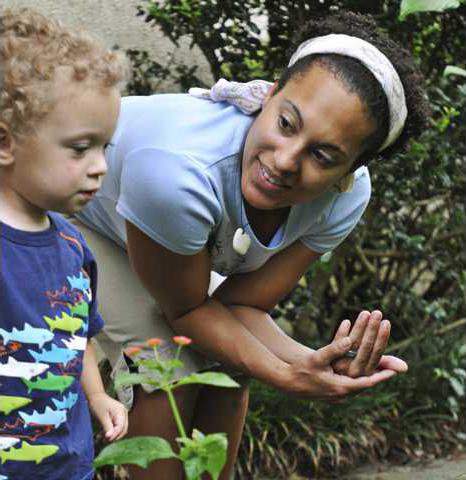In a world where penguins nest and insects as large as a man's hand exist, Statesboro native Dr. Nikki Grant Hoffman climbed over rocks and through stands of odd, twisted trees.
An ecologist who recently completed her Ph. D. work at the University of Alaska-Fairbanks, Hoffman conducted a great deal of her research on islands off the coast of New Zealand, studying the effect of rats on native vegetation and insects.
New Zealand is a strange place, and there are no land-based mammals there native to the country, with the exception of bats, Hoffman said. But over the years, ship rats and Norway rats, stowaways on ships bringing items into New Zealand, invaded the land and wrought havoc on the natural environment, she said.
While eradication is lowering the numbers of the invasive rodents, and efforts are being made to preserve the natural habitat, the damage has been done, she said.
"The vegetation is not recovering very well," she said. Rats devoured seeds, which reduced the reproduction of many plants. One species of native plant survived because the rats did not digest the seeds, but other plants were "just hammered" by the rats, Hoffman said.
Hoffman saw a completely different world during her visits to the South Pacific islands, including Poor Knights Island and the Great Barrier Islands. There were creatures such as wetas - several varieties of grasshopper - or locust-like insects the size of your hand. Some dwell in trees while others are "like moles," she said. "Some live in caves. They are very interesting insects - sort of prehistoric."
Then there were tree ferns - ferns, but a kind that grow so large they form trees. "It was like a prehistoric painting, full of unique plants and animals," she said.
One thing Hoffman enjoyed seeing were penguins nesting. "They don't walk very well, and it was surprising to see them so high" up on the rocky islands. She also saw kiwis, which are odd little birds native to the islands. "They're different than anything you would see in the States," she said.
Hoffman talked about how difficult it was to get onto some of the islands. The shores are so rocky she and others would often have to use a rowboat from a larger boat to access the islands, and then be very careful in climbing over the rocks to get to the island's mainland.
It was an adventure, Hoffman said. But now she is back in the United States and facing yet another adventure.
Hoffman enjoyed a brief visit with parents, Dale and Will Grant of Statesboro before heading west, where she will be working.
Having received a government grant, Hoffman and her family will be living in Colorado, where she will work with the Bureau of Land Management (BLM) as an ecologist.
Hoffman, married to Dr. Aaron Hoffman, is mother of two sons, Walter, 2 years old, and Anders, 5 months.
An ecologist who recently completed her Ph. D. work at the University of Alaska-Fairbanks, Hoffman conducted a great deal of her research on islands off the coast of New Zealand, studying the effect of rats on native vegetation and insects.
New Zealand is a strange place, and there are no land-based mammals there native to the country, with the exception of bats, Hoffman said. But over the years, ship rats and Norway rats, stowaways on ships bringing items into New Zealand, invaded the land and wrought havoc on the natural environment, she said.
While eradication is lowering the numbers of the invasive rodents, and efforts are being made to preserve the natural habitat, the damage has been done, she said.
"The vegetation is not recovering very well," she said. Rats devoured seeds, which reduced the reproduction of many plants. One species of native plant survived because the rats did not digest the seeds, but other plants were "just hammered" by the rats, Hoffman said.
Hoffman saw a completely different world during her visits to the South Pacific islands, including Poor Knights Island and the Great Barrier Islands. There were creatures such as wetas - several varieties of grasshopper - or locust-like insects the size of your hand. Some dwell in trees while others are "like moles," she said. "Some live in caves. They are very interesting insects - sort of prehistoric."
Then there were tree ferns - ferns, but a kind that grow so large they form trees. "It was like a prehistoric painting, full of unique plants and animals," she said.
One thing Hoffman enjoyed seeing were penguins nesting. "They don't walk very well, and it was surprising to see them so high" up on the rocky islands. She also saw kiwis, which are odd little birds native to the islands. "They're different than anything you would see in the States," she said.
Hoffman talked about how difficult it was to get onto some of the islands. The shores are so rocky she and others would often have to use a rowboat from a larger boat to access the islands, and then be very careful in climbing over the rocks to get to the island's mainland.
It was an adventure, Hoffman said. But now she is back in the United States and facing yet another adventure.
Hoffman enjoyed a brief visit with parents, Dale and Will Grant of Statesboro before heading west, where she will be working.
Having received a government grant, Hoffman and her family will be living in Colorado, where she will work with the Bureau of Land Management (BLM) as an ecologist.
Hoffman, married to Dr. Aaron Hoffman, is mother of two sons, Walter, 2 years old, and Anders, 5 months.

